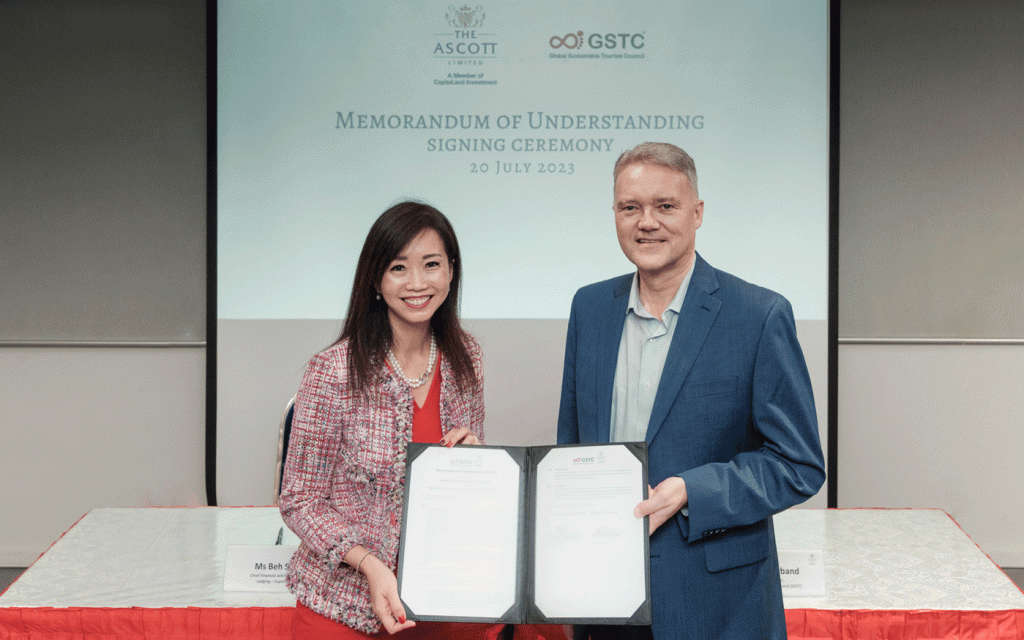Singapore-based hospitality firm, Ascott and the Global Sustainable Tourism Council (GSTC) signed an MoU yesterday afternoon that reflects their commitment to facilitating sustainability education and supporting the acquisition of internationally-recognised sustainability certifications among local tourism and hospitality industry stakeholders.
The partnership will see GSTC deliver its Sustainable Tourism Course (STC) and Sustainable Hotel Course (SHC) to an in-person audience at The Ascott Centre for Excellence (ACE), which is Ascott’s human capital training centre for the hospitality industry.

This is the first such partnership for onsite GSTC training in Singapore.
STC, to be launched in October 2023, is designed to equip trainees with a deeper understanding of environmental tools and techniques to address sustainability gaps, regulations and guidelines. These new skillsets will allow trainees to integrate sustainability as a core value across the tourism ecosystem.
SHC, which will begin classes in November 2023, will be customised by ACE for hotel and accommodation professionals. It will provide practical insights into sustainability practices for hotels and feature expert tips and resources to tap on key solutions around current issues and trends.
These courses, open to all in the industry, will support Singapore’s hotel sustainability roadmap, where at least 60 per cent of total hotel room stock are expected to achieve internationally-recognised sustainability certifications by 2025.
Beh Siew Kim, chief financial & sustainability officer, lodging, CapitaLand Investment (which Ascott is part of), said the initial intake would be for 20 to 30 participants, as the goal is to “allow for quality interactions”.
Beh told TTG Asia: “There is no trade secret in sustainability efforts. We want people to share their best practices, so that we can all do better together.”
The partnership is expected to facilitate over 700 training hours during the initial intake.
“That is a fairly aggressive target for the first run,” said Beh, who added that it is important to “grow a team of trainers in Singapore soon, which will allow local professionals to conduct the programme thereafter”. Most of the trainers are based outside of Singapore.
Developing a pool of qualified trainers here would take half a year, according to Beh, as GSTC is “very strict with the quality of trainers and who it selects to deliver its programmes”.
Based on the objectives of the partnership, Randy Durband, GSTC CEO believes that the courses will be “available in perpetuity”.
He said: “The courses will remain in demand for many years, as there are so many people who need and want it. Even among the willing, it will take hotels several years to get all their personnel trained. Furthermore, some hotels will resist initially and come around later, so the programme will have legs for quite a while.”
Durband added that continued education in sustainability is also needed, as “technology, attitudes and conditions change”.
Looking ahead, Beh and Durband shared that additional courses at ACE will be determined as needs arise, while Beh is keen to train Ascott staff around the world.
“Ninety per cent of the Ascott portfolio is outside of Singapore, so we need to think about how to get our people access to GSTC training. Of course, the first step is to train our sustainability champions – the people driving our efforts in clusters – and have them train their community,” said Beh.
Both parties hope that improved understanding of sustainability topics will help organisations to get started on this journey.
Durband said: “The lack of awareness is the number one obstacle to sustainability efforts. People are just focused on the investment, but there is so much that can be done (without huge expenses). For example, a hotel can get massive cost savings just from simple food waste management. All it needs to do is train its staff to weigh (fresh) food going out and (leftovers) coming back in, so they can track consumption, see trends and make adjustments. (Being sustainable) isn’t all about expensive procedures like refitting buildings.”
Beh added that “payback will justify the investments most of the time”.
She also hopes that the courses will create a larger pool of individuals with sustainability skillsets and experience, which is now in short supply in Singapore.




















